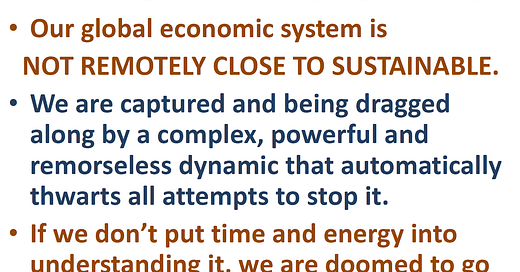A BOOK BY CHARLES W. FOWLER
Sustainable human interactions with ecosystems and the biosphere, part 9
Chapter 3
“What has survival value for the individual may be lethal for the population …” — Gregory Bateson
Selective extinction and speciation
The main focus of the chapter is on what natural selection involves. This includes opposing forces, exemplified by natural selection at the individual/egen level that can lead to extinction — a situation in which we humans likely find ourselves.
Extinction and speciation are parts of the complexity that must be taken into account in management. Evolutionary enlightenment is crucial to manageiment. Management must incorporate the universal and ubiquitous nature of selective systems failure. Conventional manegement fails to account for to account for these realityies almost entirely; in the rare occasions when they are taken into account, they are woven into the decision making process inconsistently and superficially.
The pattern-based nature of systemic management accounts for the complexity of reality including ecosystems so that it is “ecosystem-based” with all of the evolutionary and coevolutionary forces involved.
As a species, we humans are subject to species-level risks simply by virtue of being a species. This includes extinction, which would be the polar opposite of sustainability.
Wallace, Darwin, and others launched the concept of evolution as what is now considered the primary contextual paradigm for modern biology, with an historical focus at the individual and species level. This paradigm has, among its origins, many paleontological roots. Today the growing horizons of ecology are profiting from a similar consideration of the paleontological roots of selective extinction and speciation with implications for hierarchical realms of biological complexity exemplified by ecosystems.
Humans take note — attention, Red Alert: Anagenesis occurs when a species evolves within a single lineage. Modern humans began with the Great Expansion within and out of Africa 50k to 60k years ago as an anagenetic/memetic change of form from a K-strategist/K-culture species to an r-culture imposed upon a biological K-strategist that has resulted in continued r-culture selection and change in gene frequencies among 99.9999% of humans today (i.e. some genetic change, but vast cultural change in worldview and mindset). Our expansion/growth mania strongly selects for individual fitness (e.g. economic, political, religious) in a way that is lethal for the human population long term. Individual understanding of this dynamic is the only deliverance possible from it if such individuals can auto-organize into a renormalized form of human able to persist through the coming bottleneck/dissolution of modern techno-industrialized humans.
“What has survival value for the individual may be lethal for the population …” — Gregory Bateson
In one category of opposition between anagenesis and extinction, the evolution of species results in the acquisition of characteristics that are detrimental at the species level. Such changes increase the risk of extinction as an expression of the “selfish” nature of genes. Measured in terms of fitness for individual organisms, such characteristics are advantageous. However, at the species level they result in an increased threat of extinction (“evolutionary suicide,” “evolution to extinction,” or “Darwinian extinction”. In this case, individual fitness translates to porr fitness for the species as a “fatal flaw” or what is commonly called an evolutionary dead end — at least in terms of risk or probability.
Modern humans are captured and being dragged along by a dynamic that we deny or fail to understand. Continued failure to understand has a foreseeable outcome (extinction or worse — recovery to repeat the pattern until extinction).
We must be mindful of ways that humans may have evolved to be an extinction prone species. Our intelligence (at least the ways we commonly use it) may benefit individuals (or even some groups of individuals) but also increase our risk of extinction — a matter of serious concern in any evolutionarily enlightened form of management.
List of articles in this book review series: Systemic Management.





